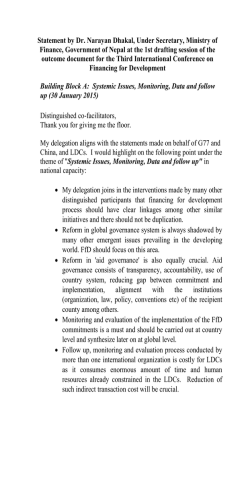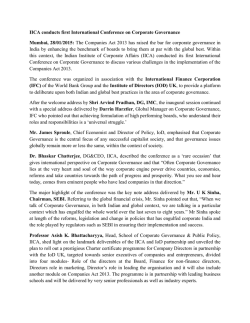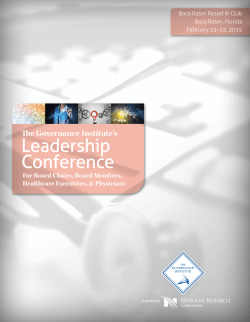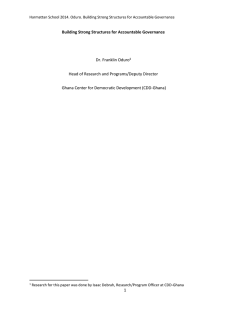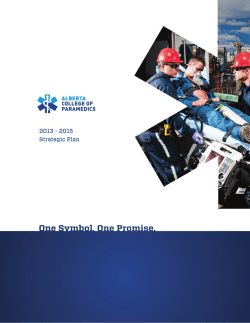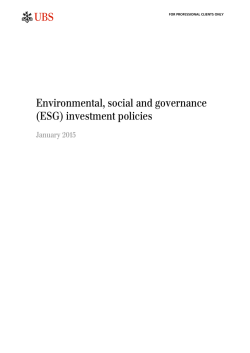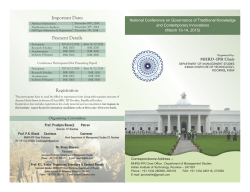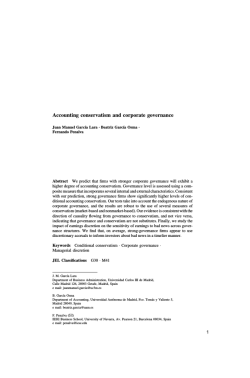
1 Building Strong Structures for Accountable Governance in Ghana
Harmattan School 2014. Nsiah. Building Strong Structures for Accountable Governance in Ghana Building Strong Structures for Accountable Governance in Ghana James K. Nsiah University for Development Studies Tamale, Ghana Email: [email protected] 1 Harmattan School 2014. Nsiah. Building Strong Structures for Accountable Governance in Ghana Abstract Effective and efficient utilization of scarce resources contributes to the overall socio–economic development of modern states and communities, a central concern of peace loving citizens. This depends on democratically appointed leaders with the right vision and appropriate competencies governing effectively by following accepted behavioural norms. At the heart of such good governance is accountability. This means that the decisions taken by public officials are subject to oversight so as to guarantee that government actions meet their stated objectives and respond to the needs of their constituencies. Such good governance contributes to poverty reduction and reduces abuse of political power and exploitation of the poor and marginalized. In order to ensure accountability, we need strong structures or culturally accepted mechanisms through which the governed may evaluate the ongoing performance of governors. Such accountability mechanisms will contribute towards providing value for money in provision of public services and instil confidence in the government. Their establishment requires a multi-stakeholder approach involving all sections of society. Constitutional, historical, cultural, technological, educational, global contemporary trends and factors among others will need to be critically delved into. This paper begins the task of exploring how such issues should be examined in the quest for accountable governance. Key words: Accountable Governance, Strong structures, National Development 1.0 Introduction The theme of this years’ Harmattan School, ‘Accountable Governance – A Key for National Development’, fits well with the recent general national concern for improved governance and leadership systems. This itself is part of the struggle for effective and efficient utilization of scarce national resources, better standards of living for Ghanaians and a place for the nation in the emerging competitive and technologically advanced global order. This paper examines the subject of accountable governance in the Ghanaian context. 2.0 Government and Accountable Governance Government may be defined as a machinery or set of institutions and persons who are authorized to manage or steer the affairs of a state, usually over a defined period of time. Government has three main organs, namely, the Legislature (Law making), Executive (Execution of polices) and Judiciary 2 Harmattan School 2014. Nsiah. Building Strong Structures for Accountable Governance in Ghana (Interpretation of Law). Governance connotes the process, method, system, manner or art of governing. Thus, the various procedures, processes and strategies employed in the management of the affairs of a country are termed governance. Governance is needed in order to avoid chaos and anarchy in the state. In order to advance the common good of the citizenry there is the need to regulate actions and behaviours of individuals and groups. This goes some way towards ensuring a sense of direction and unity of purpose in striving towards the ‘’general good’’ or public interest, such that all members of the state have a sense of belongingness. 2.1 Representative Government Representative government connotes a system by which the electorate chooses leaders into whose hands the responsibility of governing has been entrusted for the time being. Unlike the government of Greek city states, where all citizens were directly represented to express opinions and approves issues of public concern, in the large and complex modern state a small representative body is constituted to steer its affairs. It is practically impossible to involve all citizens in governing: the complexity of the task calls for the selection of technocrats to carry out some specific duties. Representative government is therefore indirect democracy. The major features of representative government include free and fair elections, the rule of law, an autonomous electoral commission, separation of powers, unlimited franchise and tolerance of varied views. By implication, a truly representative government must be responsible, answerable and accountable to the electorate. A government that is not accountable to the governed may be described as autocratic, despotic or tyrannical. 2.2 What is Accountable Governance? Accountability in governance describes the responsibility of a government towards its citizens. For a government to function effectively and efficiently, it must always remain answerable to the governed. Those governing must be aware that they derive their power and authority from the people. Hence, any activities that they undertake have to be based on sound judgment and ultimately reflect the concerns of the citizenry. In the formulation of public policy, a government is always faced with conflicting demands and concerns. The dominant and opposing ideas will merge to give a final policy based on compromises and choice between alternatives. Accountability is inherent to the process of authoritative decision-making. A government can, however, be accountable only if its actions are condoned by the 3 Harmattan School 2014. Nsiah. Building Strong Structures for Accountable Governance in Ghana governed. It is not enough to simply include accountability in a constitution. Accountability imposes responsibilities on the governed to make their views known through their representatives, through public opinion and pressure and through informed contributions in a free and educated press. The citizens must find legitimate ways to participate in the affairs of government. Those governing must be aware that there will be at least a minority of citizens who oppose each of the policies they pursue. 2.3 Accountable Governance and National Development As the development agenda of the modern state incorporates a wider range of issues than ever before, the people entrust the government with power over an unprecedented range of activities, involving, for example, environmental challenges, HIV-Aids and climate change. Therefore, there is a need for very strong mechanisms to ensure that the government does not betray peoples’ trust in any of those areas. Abuse of power, bureaucratic corruption, mismanagement of economic resources and violation of citizens’ rights need to be prevented through constitutional provisions. This explains the relevance of responsible and accountable governance in national development. 3.0 Functions and Basic Principles of Government Governance in the modern state focuses on carrying out certain functions including enacting laws, protecting citizens, administering justice, providing social amenities, promoting economic activities and employment, conducting external relations and defending the country’s territorial integrity. It is based on the equation that the governing team is mandated to exercise powers in pursuing defined goals over a period of time under stated conditions whilst the governed consent to carrying out certain duties and responsibilities in return for certain benefits and rights. Thus, legitimacy of power and consensus over its use are crucial elements in governance. In the search for how good governance can be achieved, political scientists have, over the years, put forward certain principles necessary for good governance. Among the principles are separation of powers, checks and balances, the rule of law, delegated legislation, centralization, decentralization and representative government. 4.0 Duties, Responsibilities and Rights of the Governed Rights and responsibilities go hand in hand. A citizen is a native or a naturalized member of a state. They are entitled to certain rights or liberties from it, and also, therefore, have duties or responsibilities towards it. 4 Harmattan School 2014. Nsiah. Building Strong Structures for Accountable Governance in Ghana The rights and liberties citizenship confers on the individual may be classified as follows: Political rights Political rights include the right of the citizen to participate in the political process, the right to vote and be voted for, the right to criticize the government constructively and to express opinion on all political issues without victimization. Economic rights These include the right to be employed, to work to earn an income and to own property. Social rights Social rights include access to social amenities provided by the state such as hospitals, roads, schools and pipe-borne water. Fundamental human rights Human rights are moral principles that set out certain standards of human behaviour and are regularly protected as legal rights in national and international law. They are commonly understood as inalienable, universal, egalitarian and fundamental rights to which a person is inherently entitled simply because they are a human being. They include the right to life, privacy, freedom of expression, assembly, movement, freedom of thought and conscience. Legal rights Legal rights include the right to a fair hearing in court if a person commits an offence and the right to legal representation in court. Legal rights also include the right to sue and be sued in legal court. Besides, a citizen is also entitled to protection under the laws of the state. Civil rights/Civil liberties Civil rights or civil liberties denote the totality of the basic freedoms and opportunities that an individual can receive from society irrespective of race, sex, religion or social status. These rights or liberties are guaranteed by the constitution or law. Duties and Obligations of Citizens A duty connotes a civic responsibility or an obligation which a citizen is required by law to perform for the state. The performance of a duty is the reciprocal of the protection or enabling environment which the state provides to enable the citizen to enjoy his rights. Hence the citizen owes allegiance to the state, pays taxes, obeys the laws of the state, registers births and deaths, helps to prevent crime, votes during elections and protects public property. 5 Harmattan School 2014. Nsiah. Building Strong Structures for Accountable Governance in Ghana 5.0 Building Strong Structures for Accountable Governance. In my opinion a multi-dimensional approach is needed to build strong structures for accountable governance. Several structures need to be revitalized and strengthened. These include constitutional safeguards, the rule of law, research institutions, ministries, the Auditor-General, an independent Judiciary and an effective educational system inculcating accountability principles into the people. These are expounded upon below. Constitutional Safeguards One mechanism to ensure that accountable governance is achieved is to formally entrench citizens’ rights and liberties in a written constitution, making their amendment subject to a special procedure such as a referendum. The constitutional guarantee of rights has several advantages. It creates certainty about rights, it delimits the power of the Executive and the Legislature, it helps to preserve minority rights and it helps to regulate the behaviour of individuals and promotes accountable governance. The tenure of office and powers of all public office holders should, as far as possible, be well defined. The Legislature, the Executive and the Judiciary should be separate and distinct from each other both in function and personnel. This will enhance effective checks and balances in governance. Rule Of Law Respect for the rule of law is crucial in promoting accountable governance. The principle of the rule of law postulates that it is the law that rules in the state, the exercise of governmental power shall be conditioned by law and that the subject shall not be exposed to the arbitrary rule of the ruler. The rule of law implies legality, justice, impartiality and supremacy of the law. Rule of law thus aims at safeguarding the liberties of the individual in the state and ensuring that the law is considered supreme, all persons are treated equally before the law and that the powers of public officials are limited to only those actions which they have specific authority over. Hence, rule of law will enhance a free and fair system and increase transparency and accountability in governance. True Representative Government Structures As mentioned earlier, in the modern state representative government has become more practicable in contrast to the small ancient Greek city-sates. Logistics of time, distance and space make it impossible 6 Harmattan School 2014. Nsiah. Building Strong Structures for Accountable Governance in Ghana to bring all entitled citizens together in one place to discuss their political affairs. Representative government is therefore a compromise between two ideals; firstly, an effective and strong government which gives the people what it thinks is good for them, and not necessarily what they themselves want; and secondly, a government based on the idea that people should have what they themselves want, even at the cost of speed, efficiency and consistency of policy. First and foremost, government must be as truly representative as possible. There must be free, fair and frequent elections with a register of electors and constituencies, a real choice of candidates and programs and a politically educated electorate. Secondly, an assembly must be free to discuss the issues before it and reach free decisions on them. Thus, members of the assembly and the assembly as a whole must be protected by privilege. This implies that nothing said in the assembly may be challenged in the courts or by anybody outside, nor may members of Parliament be physically interfered with or prevented from taking up their duties in the assembly. Besides, the assembly and its members must be free from interference by the government. Finally, the decisions of the assembly must be binding. Once the assembly has reached a decision, the government must accept this as binding on upon it. Strengthening Capacities of Research Institutions, Ministries, Departments, Public Corporations and Agencies It is of paramount importance that the research bodies in the country are strengthened in terms of funding and continuous training. This will enable them to live up to expectations and perform research relevant to the socio-economic and technological advancement of the country. Quality data is crucial for effective planning, benchmarking, coordinating and controlling. Besides, the various Ministries, Departments and Agencies of government need to build their capacities to carry out effective planning, coordination, evaluation and controlling in the process of national development. This will minimize rhetoric and promote accountability since public officials will be properly appraised against set goals and codes of ethics. Strengthening of the Auditor-General The role of the Auditor–General in ensuring accountability in the management of public funds is crucial. The 1992 Constitution of Ghana Article 187 spells out the role of the Auditor-General in effective 7 Harmattan School 2014. Nsiah. Building Strong Structures for Accountable Governance in Ghana management of the public purse. The Auditor-General is mandated to determine the form in which all books, records, returns and other documents relevant to public accounts should be maintained. He shall also have access to all such records for auditing purposes. In the process he may autonomously bring those breaking the law to account. Hence, strengthening the office of the Auditor-General to be able to perform its designated functions will promote discipline and accountability in the management of public funds. This will ensure that mismanagement and misapplication of public funds are minimized if not eradicated. Strengthening the Commission of Human Rights and Administrative Justice The Commission of Human Rights and Administrative Justice needs to be strengthened. It should be independent enough to be able to investigate abuses of human rights and liberties and offer redress. Independent Judiciary An impartial, unbiased and highly independent judicial system is needed to achieve accountable governance. Hence, there should be a properly constituted and independent court of law to settle all criminal and civil disputes impartially and without fear or favour. All cases must be thoroughly investigated and the trial of cases must be fair. The Judiciary should have the power to review executive acts and legislative enactments to ensure that they do not violate the rights of the individual. Indeed, the 1992 Constitution of Ghana confers judicial power on the Judiciary. Article 125 of the Constitution states that: Justice emanates from the people and shall be administered in the name of the Republic by the Judiciary which shall be independent and subject only to this Constitution. ….The judicial power of Ghana shall be vested in the Judiciary, accordingly, neither the President nor Parliament nor any organ or agency of the President or Parliament shall have or be given final judicial power. It is therefore imperative that judicial independence is consciously nurtured, promoted, and maintained to serve as a source upon which democracy thrives. This will guarantee the rights of the citizens and enhance accountable governance. 8 Harmattan School 2014. Nsiah. Building Strong Structures for Accountable Governance in Ghana Provision of Socio Economic Facilities Poverty provides fertile grounds for corruption and marginalization of a section of society by the rich. Poverty makes people tend to be more concerned about their basic needs - food, clothing and shelter than about participation in governance. Hence, in a society with a high poverty level, accountable governance may be meaningless to the majority of the people. Therefore, efforts to ensure accountable governance need to include improvements in access to socio-economic facilities like schools, hospitals and pipe-borne water and employment opportunities. Legal aid should be given to the needy whenever this becomes necessary. This will ensure an improved standard of living for the citizens. A sound economic status will enhance their propensity to pursue their rights and duties. Respect for International Conventions and Public Opinion The various international conventions like the United Nations Charter on Human Rights and on Care for Internally Displaced Persons and Refugees should be observed and enforced. International public opinion and the views of pressure groups like Amnesty International should be respected. Effective Education of the People Knowledge, they say, is power. Improved access to quality education for all citizenry is crucial in nation building. It is important that the educational system is designed to produce knowledgeable, relevant, responsible people who will be useful in national development. The system should be able to develop the needed leadership and manpower skills, utilizing scarce resources judiciously to create jobs and wealth and thereby reduce poverty levels. Patriotism, vocational/entrepreneurial skills, integrity, honesty, and accountability should be among the core values acquired through the educational system. Political socialization is crucial. The people should be educated about their rights and liberties and must be encouraged in maintaining vigilance over their rights. As the saying goes, the price of liberty is the eternal vigilance of the people. The rights and liberty of a people can be trampled upon only when they are apathetic and docile, for, as American journalist Edward Murrow said in 1954, ‘no one can terrorize a whole nation unless we are all accomplices.’ Towards these ends, the modernization of citizenry education strategies to embrace Information Communication and Technology (ICT) should be considered. Non-Formational Education should be 9 Harmattan School 2014. Nsiah. Building Strong Structures for Accountable Governance in Ghana giving attention. Civic Education lessons in formal learning set ups should rekindled. The national Anthem should be sung before all public gatherings including church services. Closely related to the need for an effective educational system is the importance of a national information policy, now needed more than ever everywhere. As the revised edition of UNESCO's Manifesto emphasizes: The public library is the responsibility of local and national authorities. It must be supported by specific legislation and financed by national and local governments. It has to be an essential component of any long-term strategy for culture, information provision, literacy and education (UNESCO, n.d.) Freedom and Independence of the Media There must be a vibrant free press to serve as a watchdog over the rights and liberties of the individual and to expose any abuse. Freedom and independence of the media must therefore be guaranteed. The 1992 Constitution of Ghana Article 162 (3-5) explains this well: There shall be no impediments to the establishment of private press or media; and in particular, there shall be no law requiring any person to obtain a license as a prerequisite to the establishment or operation of a newspaper, journal or other media for mass communication or information. Editors and publishers of newspapers and other institutions of the mass media shall not be subject to control or interference by Government, nor shall they be penalized or harassed for their editorial opinions and views, or the content of their publications. All agencies of the mass media shall at all times, be free to uphold the principles, provisions and objectives of this Constitution, and shall uphold the responsibility and accountability of the Government to the people of Ghana. 6.0 Challenges in Building Strong Structures for Accountable Governance The process of building strong institutions to ensure accountable governance in Ghana and other parts of Africa is faced with a number of challenges, prominent among which are: 10 Harmattan School 2014. Nsiah. Building Strong Structures for Accountable Governance in Ghana Use of cash in electoral processes, which sometimes affects the credibility of election results. High poverty levels, making much of the electorate easily manipulated by some elites. Lack of an effective multi-party system. The few political parties, although doing their best, have insufficient funds and weak internal democracy. High reliance on foreign aid, often affecting African governments’ ability to domesticate their economies. Lack of political will by many African governments to commit to certain decisions which may incur the displeasure of their citizens or donor partners. Western democracy and traditional governance ideals sometimes conflicting with each other about principles of good governance and accountability. 7.0 Conclusion In the light of the ever increasing population, complexity of the modern state, globalization and increased demand for economic and social amenities by the citizens, the need for effective and efficient utilization of resources in governance cannot be overemphasized. In the era of modern democracy and representative government, accountability is an integral feature of good governance. Beyond elections, there is the need to seek means to deepen democracy by nurturing full citizen participation in public policy-making and by helping to establish accountable institutions that bolster the rule of law, fair administration of justice, access to information, and government transparency. References Government of Ghana (1992) Constitution. (Accra: GoG) UNESCO (n.d.) UNESCO Public Library Manifesto. Available at: http://www.unesco.org/webworld/libraries/manifestos/libraman.html. Accessed on: 17th October 2014 11
© Copyright 2026
